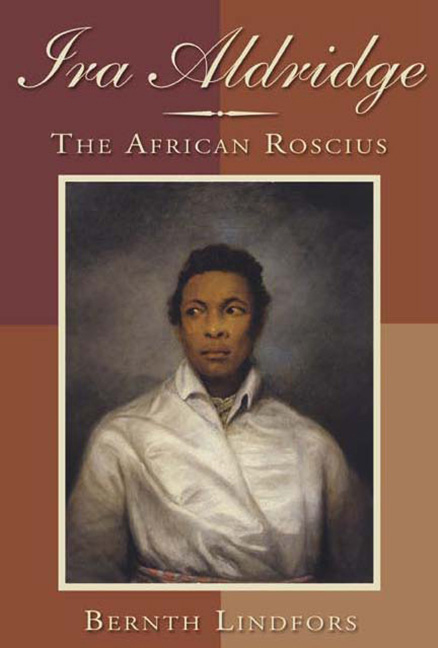Book contents
- Frontmatter
- Miscellaneous Frontmatter
- Contents
- List of Illustrations
- Acknowledgments
- Introduction
- Part One: The Life
- Part Two: The Career
- 8 Ira Aldridge's Fight for Equality
- 9 Ira Aldridge in Manchester
- 10 Acting Black: Othello, Othello Burlesques, and the Performance of Blackness
- 11 Ira Aldridge: Shakespeare and Minstrelsy
- 12 “Mislike me not for my complexion … “: Ira Aldridge in Whiteface
- 13 Ira Aldridge as Macbeth and King Lear
- 14 Creating the Black Hero: Ira Aldridge's The Black Doctor
- 15 The First American on the Zagreb Stage
- 16 A Heartwarming, Radiant Othello in the Netherlands, 1855
- 17 Ira Aldridge's Performances in Meiningen
- 18 “Othello's Occupation's Gone!” The African Roscius in Poland, 1853–67
- Notes on Contributors
- Index
- Miscellaneous Endmatter
17 - Ira Aldridge's Performances in Meiningen
from Part Two: The Career
Published online by Cambridge University Press: 26 October 2017
- Frontmatter
- Miscellaneous Frontmatter
- Contents
- List of Illustrations
- Acknowledgments
- Introduction
- Part One: The Life
- Part Two: The Career
- 8 Ira Aldridge's Fight for Equality
- 9 Ira Aldridge in Manchester
- 10 Acting Black: Othello, Othello Burlesques, and the Performance of Blackness
- 11 Ira Aldridge: Shakespeare and Minstrelsy
- 12 “Mislike me not for my complexion … “: Ira Aldridge in Whiteface
- 13 Ira Aldridge as Macbeth and King Lear
- 14 Creating the Black Hero: Ira Aldridge's The Black Doctor
- 15 The First American on the Zagreb Stage
- 16 A Heartwarming, Radiant Othello in the Netherlands, 1855
- 17 Ira Aldridge's Performances in Meiningen
- 18 “Othello's Occupation's Gone!” The African Roscius in Poland, 1853–67
- Notes on Contributors
- Index
- Miscellaneous Endmatter
Summary
In four command performances at the Hoftheater in Potsdam in January 1853, the black American actor Ira Aldridge elicited praise from distinguished Prussian audiences and marked recognition from the King of Prussia, Friedrich Wilhelm IV, who bestowed on him the Prussian Gold Medal First Class. In the same audience was one spectator who saw in Aldridge's performance far more than an evening's entertainment. That person was Georg, crown prince of the little duchy of Saxe-Meiningen, who for some years had concerned himself with improving stagecraft on the Meiningen stage. Although many years would elapse before Georg created in Meiningen the model company that revolutionized the European theater and earned him the title of the “First Modern Stage Director,” he had already developed a clear understanding of the changes that were needed. He recognized in Aldridge's performance distinctive gifts that, properly adapted, would contribute to enriching the German stage.
The twenty-six-year-old prince, at that time serving in the Guards Regiment at the court of Friedrich Wilhelm IV, had arrived at his notions of theater reform via a long artistic education. The only child of the ruling duke of Meiningen until he was seventeen, Georg enjoyed an education that embraced all the arts. His first teachers, a theologian and a court artist, fixed in the child a love of all art and an appreciation of its spiritual values, values emphasized by Moritz Seebeck, his second teacher. Georg early showed considerable talent for drawing, leading the deeply religious Seebeck to believe that such gifts should be carefully cultivated. When the artist Wilhelm Lindenschmit was engaged to paint historically correct murals on the castle walls, Georg studied the artist's subject matter and methods carefully. Composition and movement especially commanded his attention. Under Lindenschmit's instruction, Georg began a large historical painting that was to occupy him for years. The sketches for this work as well as the completed painting show how skillful the prince already was in composing groups and showing men and horses in action.
- Type
- Chapter
- Information
- Ira AldridgeThe African Roscius, pp. 234 - 242Publisher: Boydell & BrewerPrint publication year: 2007

